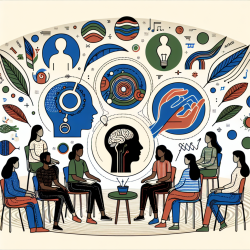Special education for children with chronic health conditions or disabilities necessitates the integration of healthcare work with educational processes. This integration, although essential, often encounters numerous challenges. The research article titled An institutional ethnography inquiry of health care work in special education: a research protocol by Ng et al. (2013) offers a data-driven approach to understanding and improving these processes through institutional ethnography.
Understanding Institutional Ethnography
Institutional ethnography (IE) is a methodological approach that maps the actualities of individuals' daily work activities and examines them in relation to broader sociopolitical contexts. By focusing on the disjunctures between policy and practice, IE can reveal areas for improvement in integrated care processes. This approach is particularly useful in special education, where the coordination of healthcare and educational services is critical yet complex.
Key Findings from the Research
The study by Ng et al. (2013) highlights several key areas where practitioners can focus their efforts to improve integrated care in special education:
- Documentary Practices: The way documents are created, shared, and utilized can significantly impact the effectiveness of integrated care. Health professionals' reports often serve as the primary means of communication with educators. Understanding and optimizing these documentary practices can enhance collaboration.
- Communication Barriers: Effective communication between healthcare providers and educators is essential. The study found that ill-defined roles and responsibilities, along with differing attitudes and values, often hinder effective communication. Addressing these barriers can improve team collaboration.
- Invisible Work: Much of the work involved in integrating healthcare and education is invisible and unrecognized. By mapping these hidden activities, practitioners can better understand and address the gaps between policy and practice.
Implementing Institutional Ethnography in Practice
Practitioners can utilize the findings from this research to improve their own integrated care processes. Here are some actionable steps:
- Conducting IE Studies: Practitioners can adopt IE methods, such as document collection, interviews, and observation, to understand the specific work processes in their own settings. This can help identify disjunctures and areas for improvement.
- Enhancing Communication: Developing clear protocols for communication between healthcare providers and educators can help bridge the gaps identified in the study. Regular meetings and collaborative platforms can facilitate better information sharing.
- Recognizing Invisible Work: Acknowledging and documenting the informal and unpaid work done by families and other stakeholders can provide a more comprehensive understanding of the integrated care process.
Encouraging Further Research
The study by Ng et al. (2013) provides a foundational understanding of the complexities involved in integrating healthcare and education. However, further research is needed to continue improving these processes. Practitioners are encouraged to conduct their own IE studies and share their findings to contribute to the broader knowledge base.
To read the original research paper, please follow this link: An institutional ethnography inquiry of health care work in special education: a research protocol.










